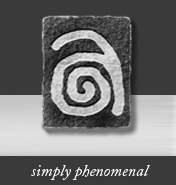A Public Scholar for Parapsychology
July 6, 2007
 Independent researcher Annalisa Ventola reviews three more of our D. Scott Rogo books in the Summer 2007 issue of the Journal of Scientific Exploration. She begins with Miracles: A Parascientific Inquiry into Wondrous Phenomena, which provides a parapsychological interpretation of various phenomena recorded in religious traditions. She notes that although “miraculous phenomena are untidy and elude simple classification…Rogo rather enthusiastically gets up to his elbows in it. In the end, he suggests that the power of belief might be strong enough to create an independent spiritual reality for the culture that supports it.” Ventola finds the book “well-researched and thoughtfully written,” and notes that “it remains one of the few introductory books available on this topic.”
Independent researcher Annalisa Ventola reviews three more of our D. Scott Rogo books in the Summer 2007 issue of the Journal of Scientific Exploration. She begins with Miracles: A Parascientific Inquiry into Wondrous Phenomena, which provides a parapsychological interpretation of various phenomena recorded in religious traditions. She notes that although “miraculous phenomena are untidy and elude simple classification…Rogo rather enthusiastically gets up to his elbows in it. In the end, he suggests that the power of belief might be strong enough to create an independent spiritual reality for the culture that supports it.” Ventola finds the book “well-researched and thoughtfully written,” and notes that “it remains one of the few introductory books available on this topic.”
 With The Search for Yesterday: A Critical Examination of the Evidence for Reincarnation, Ventola finds Rogo attempting “to shake researchers out of their ‘research grooves’” by questioning their very definition of reincarnation. While the work of the late Ian Stevenson has become synonymous with reincarnation research, “Rogo attempts to go beyond this research paradigm, introducing the public to a variety of approaches to the question of reincarnation, including hypnosis, regression, past-life therapy, and the past-life recall reported by researchers studying the properties of psychoactive drugs.” In doing so, the book, which uses “some unusual and unexpected sources,” promotes “a well-rounded examination of the evidence,” according to Ventola.
With The Search for Yesterday: A Critical Examination of the Evidence for Reincarnation, Ventola finds Rogo attempting “to shake researchers out of their ‘research grooves’” by questioning their very definition of reincarnation. While the work of the late Ian Stevenson has become synonymous with reincarnation research, “Rogo attempts to go beyond this research paradigm, introducing the public to a variety of approaches to the question of reincarnation, including hypnosis, regression, past-life therapy, and the past-life recall reported by researchers studying the properties of psychoactive drugs.” In doing so, the book, which uses “some unusual and unexpected sources,” promotes “a well-rounded examination of the evidence,” according to Ventola.
 But she reserves some of her highest praise for Our Psychic Potentials, pointing out how it stands out from the “multitude of books and courses on the market purporting to enhance one’s psychic abilities.” While “Rogo’s strategies could very well form the basis for a formal self-training course in ESP,” Ventola calls the book “an ambitious work “ that “asks a lot of the solitary practitioner.” But when visitors to her Public Parapsychology blog ask how they can develop their own psychic abilities, “I have recommended this book to them. Unlike most other books on the subject, this book is devoid of the new age platitudes typically found in such discussions, and provides a very good introduction to the parapsychological literature, complete with references for further exploration.”
But she reserves some of her highest praise for Our Psychic Potentials, pointing out how it stands out from the “multitude of books and courses on the market purporting to enhance one’s psychic abilities.” While “Rogo’s strategies could very well form the basis for a formal self-training course in ESP,” Ventola calls the book “an ambitious work “ that “asks a lot of the solitary practitioner.” But when visitors to her Public Parapsychology blog ask how they can develop their own psychic abilities, “I have recommended this book to them. Unlike most other books on the subject, this book is devoid of the new age platitudes typically found in such discussions, and provides a very good introduction to the parapsychological literature, complete with references for further exploration.”
Ventola then tops off her review by admitting how she finds herself “infected by Rogo’s enthusiasm for the field of parapsychology and the promise of its findings. I admire how he communicated even the most arcane details of laboratory experiments in a cogent, yet personal manner. In doing so, he took on the underestimated role of public scholar, a role that parapsychologists have largely neglected in the 21st century.”









